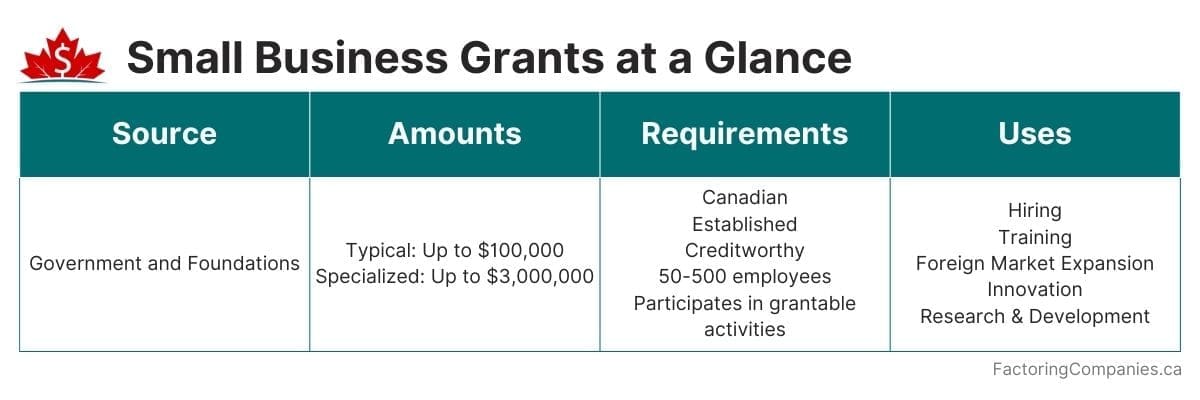
Wondering what to do if you don’t qualify for a small business grant? Whether you’ve already applied and are anxiously waiting or have already received a denial, the question can weigh heavily on your shoulders.
First, the good news. If you’re still waiting to hear back, the odds are that you’re likely to be approved. Just four percent of small businesses are denied government grants, according to Canada Post.
Despite this, many business owners still receive denials, as City News reports. Those who receive the unfortunate letters are met with “all decisions are final” and “no appeal” notices, often with little explanation as to why.
With that in mind, those asking, “What if I don’t qualify for a small business grant?” have a valid question. But there’s good news here too. While you may not be able to appeal the decision, you might be able to qualify next time if you understand what went wrong this time. And in the meantime, there are alternate ways to fund your business. Give us a moment, and we’ll walk you through some of the most common reasons why denials happen and what to do if you don’t qualify for a small business grant right now.
What Are Canadian Small Business Grants and How Do They Work
Grants are often described as “free money” to run your business. Canada has a very robust grant system, with opportunities to obtain grant money at the federal, provincial or city level, though sometimes nonprofits offer them too.
They’re not like loans, lines of credit, or other funding methods your business has to pay back with interest and fees. Instead, you get to keep the money and do not have to pay it back. However, most follow a “claim-back” process. This basically means that the grant program reimburses you for approved expenses after you’ve paid them out of your own pocket. Because of this, you must have sufficient working capital to fund your initiatives.
The application and approval process is similar to a bank loan. You’ll usually need to supply standard financial reports, a business plan, and other documentation. Your credit will also likely be checked. After you submit your application, it can take about two to six weeks to hear back, depending on the grant type.
Although many business owners are unaware these grants exist, competition for them remains fierce. Sometimes grant opportunities are only open for a day or two and then stop accepting applications due to the deluge they receive.
Typical Small Business Grant Qualifications
Virtually every governmental small business grant will expect you to be:
- Registered in Canada
- Incorporated
Additional Qualifications for Some Grants
Although some grants allow startups and non-employer firms, most require you to:
- Be established for one or two years
- Employ 50-500 people

Top Reasons for Small Business Grant Denials
Most small businesses are approved for at least some of their requested funding. Outright denials usually come down to a handful of causes.
You Didn’t Meet the Grant’s Criteria
Each small business grant has different requirements. For instance, some accept startups, while others require the business to be in operation for one year or two years. Some are designed to support specific disadvantaged groups, while others are open to anyone. If you don’t check off all their boxes as an applicant, your small business grant will be denied.
You Don’t Have a Business Plan
Grant providers want to put their cash where it will do the most good. Unless you know where your business is and where it plans to go, you can’t expect them to have much faith in your endeavour, either.
Your Credit is Bad
On the surface, it doesn’t make sense for a grant provider to check your credit if you don’t have to pay the money back. However, your business credit is seen as a measure of financial responsibility, and your financial responsibility is a major determining factor in the success of your business.
Your Timing is Off
The window for some small business grants closes very quickly. If you miss the application deadline, a deadline to supply additional information, or don’t respond to inquiries for information, you’re likely to be denied.
Your Needs Don’t Match the Grant
Grant providers also typically ask how you intend to spend the cash. This area can trip people up because some things you expect to be covered aren’t. For instance, a hiring grant won’t typically allow you to use funds to pay for contractors. Most training grants don’t cover tuition or costs covered by scholarships. Market expansion grants often exclude wages for those involved in managing or executing your expansion project, nor do they generally cover operational expenses.
If you indicate that you intend to spend the cash in a way that doesn’t align with the grant type or apply for the wrong type of grant for your needs, you’ll almost always be denied.
What to Do if You Don’t Qualify for a Small Business Grant
If you don’t qualify for a small business grant, there are a few things you can do to improve your odds of approval next time and ensure your business has the cash it needs today.
Review Your Denials

If you’ve already received a denial, carefully examine your letter and the grant’s requirements.
Check To Ensure That You Meet All Necessary Criteria
Verify that you and your small business meet all criteria listed on the grant application and corresponding materials. Make a note of anything that disqualified you or anything you’re unsure of.
Make Sure You Are Applying for The Right Grant
Review the type of grant you applied for and ensure your intended use of funds aligns with the grant’s expectations.
Confirm You Submitted All Required Documentation
Grant providers will often contact applicants if they have questions or if anything is missing from the application. However, as City News reports, there are cases in which applicants are confident they never received a request for additional information and simply received the denial instead. Go through your application packet and compare the documents you provided with their requirements. Make a note of anything missing or that may have provided the required information but might have appeared unclear to the person reviewing your application.
Prepare for Future Applications

Because many grants don’t have an appeals process and consider all decisions final, identifying what went wrong won’t allow you to qualify for funding during this round. However, it can help you be prepared the next time you apply. It’s also advantageous to use the downtime between application cycles to strengthen your position and increase approval odds. That way, you can work through everything at your own pace and ensure your case is airtight.
Incorporate
You may not qualify for funding, from grants or lenders, as a sole proprietor. Consider incorporating if this is holding you back.
Draw Up a Strong Business Plan
Take time to craft a strong business plan. If you already have one, review it and recruit a few people you trust to evaluate it. Your business plan should include:
- An executive summary with your mission statement and details about how the company operates and key players.
- Details about the products and services offered, as well as any patents or proprietary technology the business possesses.
- A market analysis that covers consumer demand and how you’ll manage the competition.
- A marketing strategy that outlines how you’ll attract and retain customers, including channels used and campaigns.
- Financial planning and projections that indicates current performance and future targets.
- A detailed budget that breaks down all expenses by department.
Add Dates and Deadlines to Your Calendar
Many grants work in cycles, accepting applications annually, quarterly, or by some other schedule. Look for deadlines for any grants you want to apply for and set reminders for key dates in your digital calendar. Again, because competition is fierce, you’ll want to set your reminder early enough that you have time to put everything together before the application period begins. That way, you only need to send in what you have when it opens, and the window won’t close.
Be aware, however, that the rules and expectations for grants can change from one cycle to the next. If you use this approach, always take the time to re-read all guidelines before applying to ensure you still meet all qualifications and are submitting everything required.
Strengthen Your Credit Rating
Check your business credit score and see how much you need to move the needle. Sometimes, simply paying bills on time is enough. However, you can also get a boost by asking vendors to report your transactions, paying down debt, and avoiding taking on new debts.
Connect with a Mentor or the Greater Small Business Community
Being a business owner can sometimes feel isolating, especially if you’re the only leader within your company. Seek out opportunities to connect with others in the business community. A mentor, for example, can help guide and inspire you as you grow your business. You can also join groups with your peers to share ideas and motivate each other. If you make strong connections, you may be able to turn to them for help shoring up your business plan or addressing other issues that may have contributed to a previous denial.
Try an Alternative Source of Funding

There are many ways to get alternative funding for SMEs. Although most, such as loans and lines of credit, create debt you pay back with interest and fees, other options like invoice factoring are debt-free. This is because the cash you’re receiving is actually from your unpaid B2B invoices. Your factoring company advances most of the invoice’s value immediately, then sends you the remaining sum minus a small factoring fee once your client pays.
Accounts receivable factoring can help you bridge a cash flow gap if you’re denied a small business grant or don’t receive the level of funding you need. It can also help you boost your credit by keeping your debt ratio low.
Get the Working Capital You Need with Invoice Factoring
If you don’t qualify for a small business grant or don’t qualify for the amount of cash you need, invoice factoring may be your ideal next step. Check out our Complete Guide to Invoice Factoring to learn more about the process, or request a complimentary factoring quote to get started.

About Factoring Companies Canada
Related Articles
Get an instant factoring estimate
Factoring results estimation is based on the total dollar value of your invoices.
The actual rates may differ.
CLAIM YOUR FREE FACTORING QUOTE TODAY!
PREFER TO TALK?
You can reach us at
1-866-477-1778
Get an instant factoring estimate
Factoring results estimation is based on the total dollar value of your invoices.
The actual rates may differ.
CLAIM YOUR FREE FACTORING QUOTE TODAY!
PREFER TO TALK? You can reach us at 1-866-477-1778











